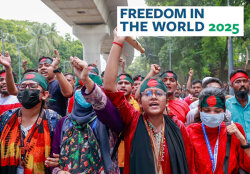Global Freedom Levels in 2025: A Comprehensive Overview
The organization Freedom House published its new "Freedom in the World 2025" report, covering 195 countries and territories. The report categorizes states as "Free," "Partly Free," or "Not Free", while also analyzing key global trends affecting freedom and democracy.
General Trends: Decline of Democracy
According to the report, the level of global freedom continues to decline. In 2024, many democracies faced significant challenges such as rising political violence, intensifying repression, and increasing pressure on independent media. However, in some countries, democratic processes showed resilience despite unfavorable conditions.
- 60 countries experienced a decline in political rights and civil liberties, while 34 countries showed improvement.
- The sharpest declines were recorded in El Salvador, Haiti, Kuwait, and Tunisia, whereas improvements were noted in Bangladesh, Bhutan, Sri Lanka, and Syria.
- In over 40% of countries that held national elections in 2024, candidates and polling stations were attacked.
- Conflicts worldwide undermined democratic progress, causing greater insecurity and making 2024 less safe and less free than previous years.
Over the last 19 years, the greatest declines were observed in El Salvador, Serbia, and Venezuela, where democratic institutions were systematically dismantled, leading to authoritarian rule. Other countries with major declines since 2005 include the Central African Republic, Haiti, and Mali, where widespread violence and a lack of security have long prevented people from enjoying basic rights.
In 2025, global freedom remains under threat due to increasing armed conflicts and tightening repression.
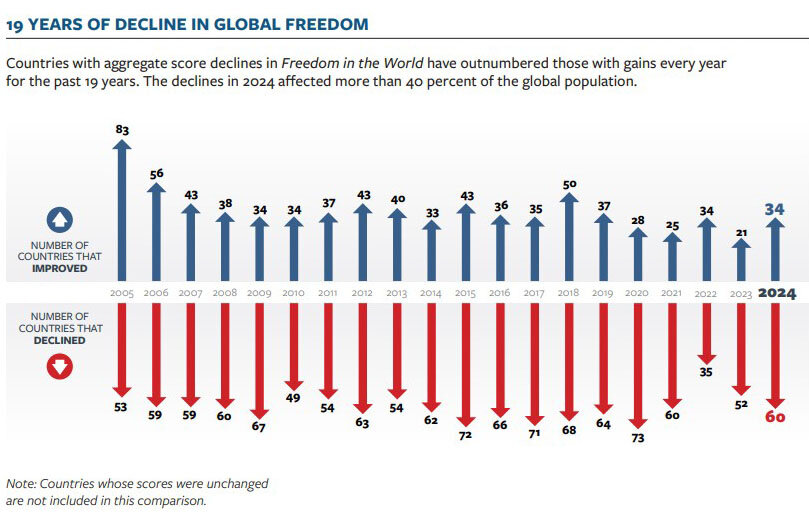
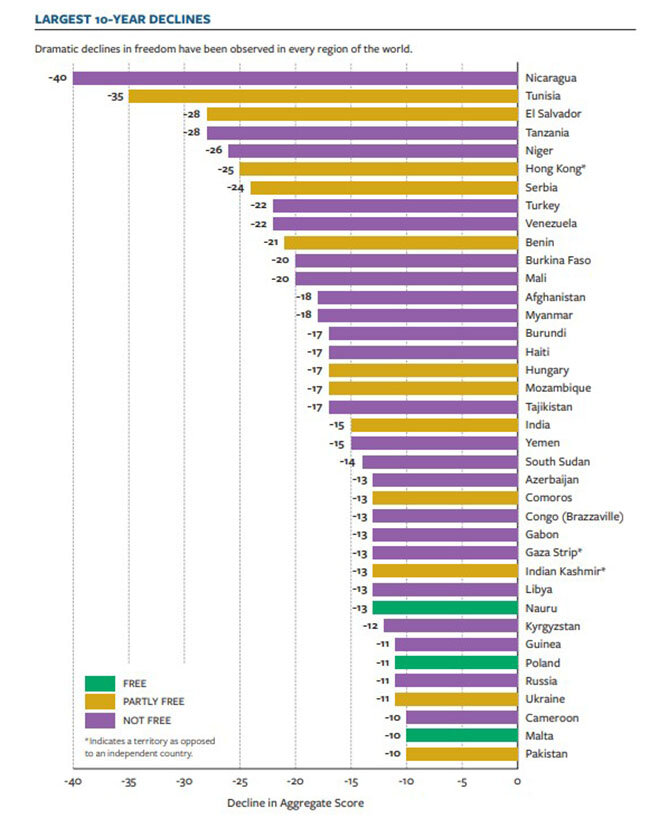
Violence and Suppression of Political Opponents
Violence became a central issue in 2024, particularly in 27 out of 66 countries and territories that held national elections.
- In 20 countries, candidates were attacked.
- In Mexico and South Africa, criminal groups sought political influence through violence.
- In France, Japan, South Korea, the UK, and the US, political extremism led to physical attacks on candidates.
- In 14 countries, polling stations were attacked, making voting unsafe or impossible.
- Election-related protests turned violent in 11 nations.
In "Free" countries, elections remained competitive. However, in authoritarian states like Azerbaijan, Algeria, Russia, and Rwanda, opposition candidates were arrested, imprisoned, or disqualified to prevent any real competition.
Despite these negative trends, some countries made democratic progress:
- Bhutan and Senegal moved from "Partly Free" to "Free", with Bhutan strengthening democratic institutions.
- Indian-administered Kashmir improved from "Not Free" to "Partly Free", following the return of elections, restoring some political representation.
Armed Conflicts
Ongoing wars and armed conflicts had severe effects on security and freedom in 2024, marking them as one of the year's most significant trends.
- 20% of countries and territories received 0/4 points for physical safety and freedom from violence.
- These conflicts threatened democracies worldwide, fueling illegal arms trafficking, organized crime, terrorism, and global instability.
- Ukraine, Myanmar, Sudan, and the Middle East saw widespread violence, displacing millions of people.

Organized Crime
In Latin America and the Caribbean, countries faced a triple threat:
- Widespread violence by organized crime groups.
- Corruption and government infiltration by criminal organizations.
- Repressive measures by authorities to fight crime, often limiting civil liberties.
- Haiti suffered one of the sharpest declines in freedom due to unchecked criminal violence.
- In Mexico, drug cartels co-opted local governments and law enforcement.
- Ecuador saw criminal groups infiltrating the judiciary and government, complicating efforts to combat crime.
- El Salvador saw a decline in crime, but at the cost of severe restrictions on basic rights and freedoms.
Countries That Became "Not Free" in 2024
Several countries fell from "Partly Free" to "Not Free":
- Thailand – The Constitutional Court dissolved the leading opposition party that won the most votes in the 2023 elections.
- Kuwait – The Emir dissolved parliament indefinitely, ruling without an elected government.
- Niger – A military junta took control, suppressing media and civil rights.
- Tanzania – Mass arrests and forced evictions of Indigenous communities raised concerns.
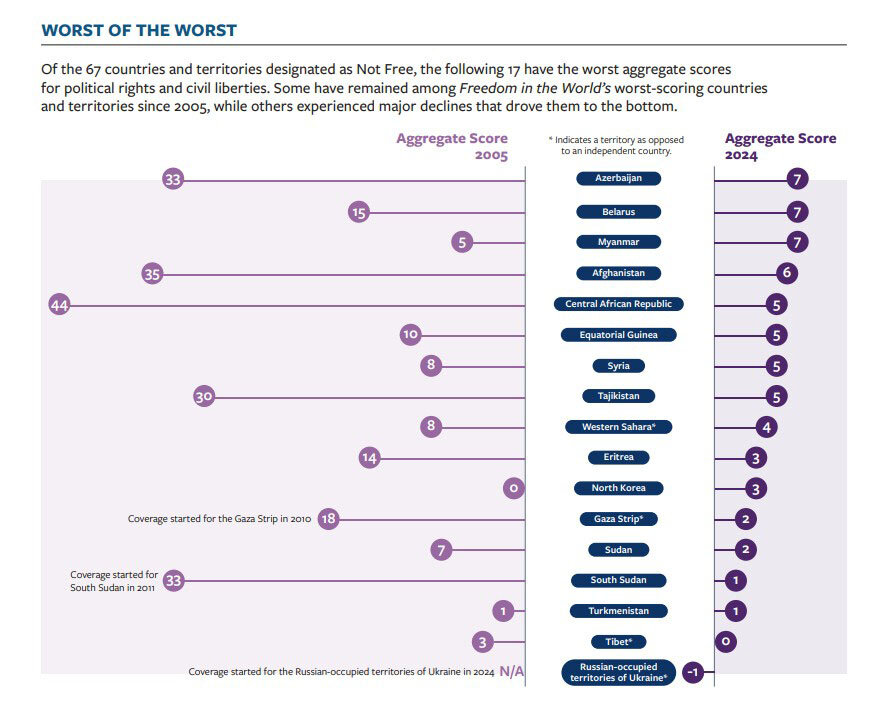
Freedom of Speech Under Threat
Over the past 19 years, press freedom has declined dramatically:
- The number of countries with zero press freedom nearly tripled, from 13 (2005) to 34 (2024).
- Over 120 nations saw censorship, journalist arrests, legal persecution, and violence.
Vietnam, and Hong Kong are among the worst offenders.
"Oases of Democracy"
Despite the global decline in freedom, some countries stood out as bright spots for democracy:
- Bangladesh – Initiated major political and judicial reforms.
- Sri Lanka – Elected an anti-corruption president.
- Poland – Parliamentary elections reversed democratic backsliding.
- South Korea – Protected civil liberties and ended emergency laws.
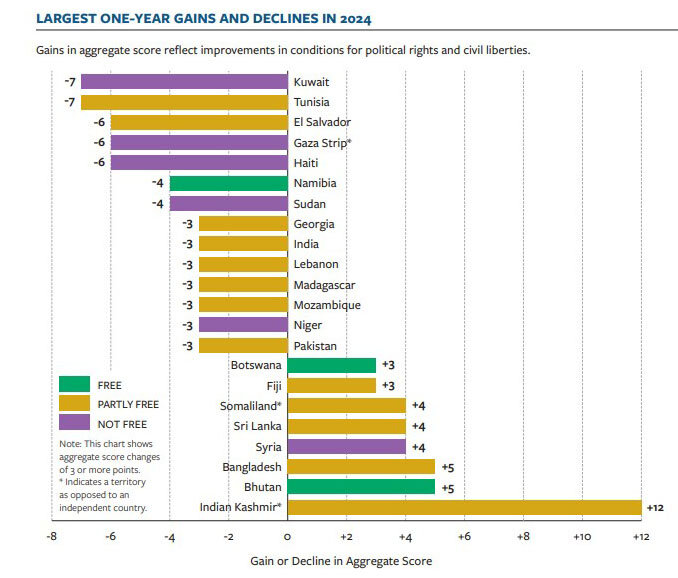
The Role of Democratic Systems
Democracies protect individual rights and freedoms through checks and balances. These systems prevent abuses of power but are vulnerable to political populism.
- Authoritarian leaders often try to bypass institutional limits to consolidate power.
- The U.S. election in 2025 will be closely watched, as former President Donald Trump has promised actions that could erode democratic institutions.
- Trump vowed to prosecute political opponents.
- Plans to limit federal agencies, the civil service, and the press could weaken the rule of law.
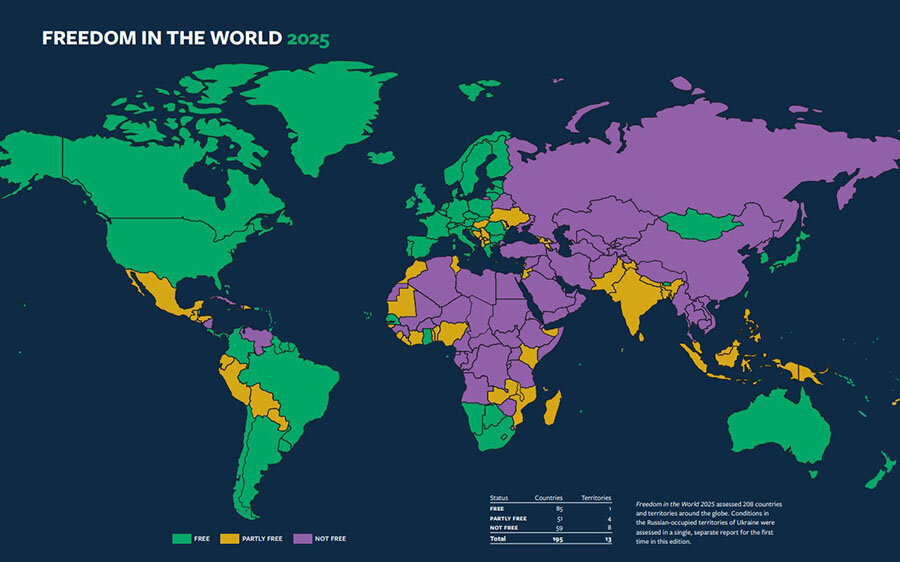
Key Takeaways
- Freedom worldwide continues to decline due to conflicts, authoritarian rule, and organized crime.
- Some democracies are resilient, but others have collapsed into repression and violence.
- A few countries made progress, proving that democratic change is still possible.









